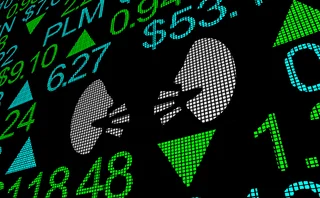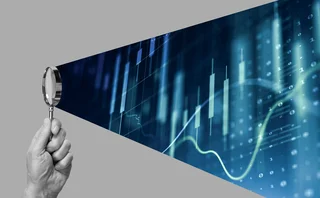Word Is Bond
ASK THE BUY SIDE
With more than $590 billion in assets under management, Pimco has little need for black-box trading. Instead, according to Mark Kiesel, executive vice president, generalist portfolio manager, the firm prefers a more hands-on approach when it comes to planning and executing deals. That said, the 36-year-old Michigan native is hardly a Luddite. Waters chatted with Kiesel about his views on homegrown technology, the evolving global market and what keeps him busy 24 hours a day.
Waters: Does Pimco
Only users who have a paid subscription or are part of a corporate subscription are able to print or copy content.
To access these options, along with all other subscription benefits, please contact info@waterstechnology.com or view our subscription options here: http://subscriptions.waterstechnology.com/subscribe
You are currently unable to print this content. Please contact info@waterstechnology.com to find out more.
You are currently unable to copy this content. Please contact info@waterstechnology.com to find out more.
Copyright Infopro Digital Limited. All rights reserved.
As outlined in our terms and conditions, https://www.infopro-digital.com/terms-and-conditions/subscriptions/ (point 2.4), printing is limited to a single copy.
If you would like to purchase additional rights please email info@waterstechnology.com
Copyright Infopro Digital Limited. All rights reserved.
You may share this content using our article tools. As outlined in our terms and conditions, https://www.infopro-digital.com/terms-and-conditions/subscriptions/ (clause 2.4), an Authorised User may only make one copy of the materials for their own personal use. You must also comply with the restrictions in clause 2.5.
If you would like to purchase additional rights please email info@waterstechnology.com
More on Trading Tech
Artificial intelligence, like a CDO, needs to learn from its mistakes
The IMD Wrap: The value of good data professionals isn’t how many things they’ve got right, says Max Bowie, but how many things they got wrong and then fixed.
Symphony looks to cloud, AI for enhanced trader voice
The communication and collaboration platform provider is utilizing modern technology to grow its network of services and users.
Observations and lessons to learn from the move to T+1
The next few years will see other jurisdictions around the world look to North America for guidance on transitioning to shorter settlement cycles.
As US options market continued its inexorable climb, ‘plumbing’ issues persisted
Capacity concerns have lingered in the options market, but progress was made in 2024.
Doubts raised over new FX platform disclosures
New disclosure sheet template will require platforms to outline how they charge for data
Expanded oversight for tech or a rollback? 2025 set to be big for regulators
From GenAI oversight to DORA and the CAT to off-channel communication, the last 12 months set the stage for larger regulatory conversations in 2025.
DORA flood pitches banks against vendors
Firms ask vendors for late addendums sometimes unrelated to resiliency, requiring renegotiation
IPC’s C-suite shuffle signals bigger changes for trader voice tech
Waters Wrap: After a series of personnel changes at the legacy provider, WatersTechnology examines what these moves might mean for the future of turrets and trader voice.







